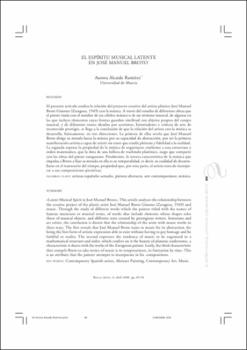El espíritu musical latente en José Manuel Broto
Author
Alcaide Ramírez, AuroraDate
2008Abstract
El presente artículo analiza la relación del proyecto creativo del artista plástico José Manuel
Broto Gimeno (Zaragoza, 1949) con la música. A través del estudio de diferentes obras que
el pintor titula con el nombre de un célebre músico o de un término musical, de algunas en
las que incluye elementos cuyas formas guardan similitud con objetos propios del campo
musical, y de diferentes textos ideados por escritores, historiadores y críticos de arte de
reconocido prestigio, se llega a la conclusión de que la relación del artista con la música se
desarrolla, básicamente, en tres direcciones. La primera de ellas revela que José Manuel
Broto dirige su mirada hacia la música por su capacidad de abstracción, por ser la primera
manifestación artística capaz de existir sin tener que rendir pleitesía y fidelidad a la realidad.
La segunda expresa la propiedad de la música de organizarse conforme a una estructura y
orden matemático, que la dota de una belleza de trasfondo platónico, rasgo que comparte
con las obras del pintor zaragozano. Finalmente, la tercera característica de la música que
impulsa a Broto a fijar su mirada en ella es su temporalidad, es decir, su cualidad de desarrollarse
en el transcurrir del tiempo, propiedad que, por otra parte, el artista trata de incorporar
a sus composiciones pictóricas. This article analyses the relationship between
the creative project of the plastic artist José Manuel Broto Gimeno (Zaragoza, 1949) and
music. Through the study of different works which the painter titled with the names of
famous musicians or musical terms, of works that include elements whose shapes echo
those of musical objects, and different texts created by prestigious writers, historians and
art critics, the conclusion is drawn that the relationship of the artist with music works in
three ways. The first reveals that José Manuel Broto turns to music for its abstraction, for
being the first form of artistic expression able to exist without having to pay homage and be
faithful to reality. The second expresses the tendency of music to be organised in a
mathematical structure and order, which confers on it the beauty of platonic undertones, a
characteristic it shares with the works of the Zaragozan painter. Lastly, the third characteristic
that compels Broto to take notice of music is its temporariness, its limitation by time. This
is an attribute that the painter attempts to incorporate in his .compositions.





